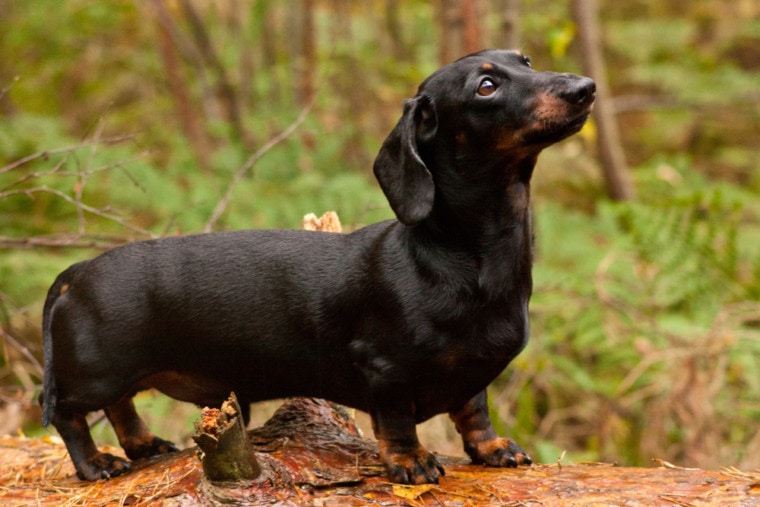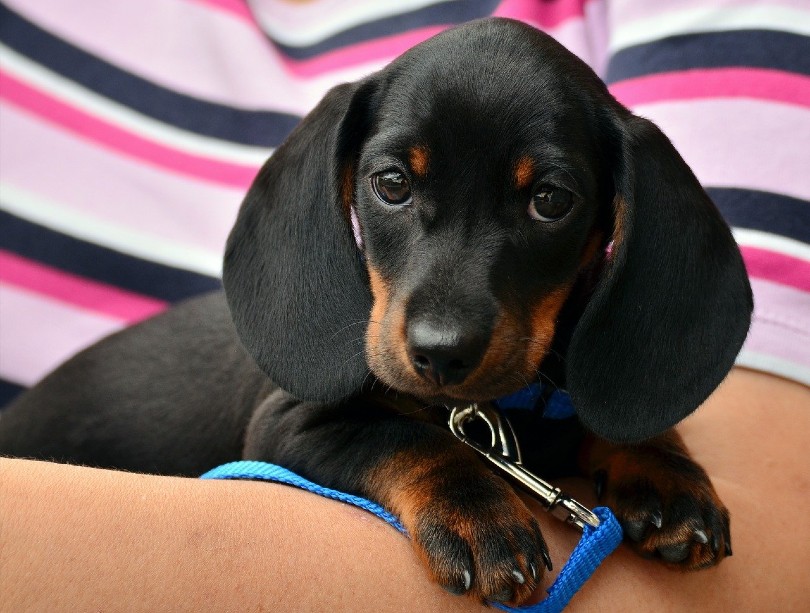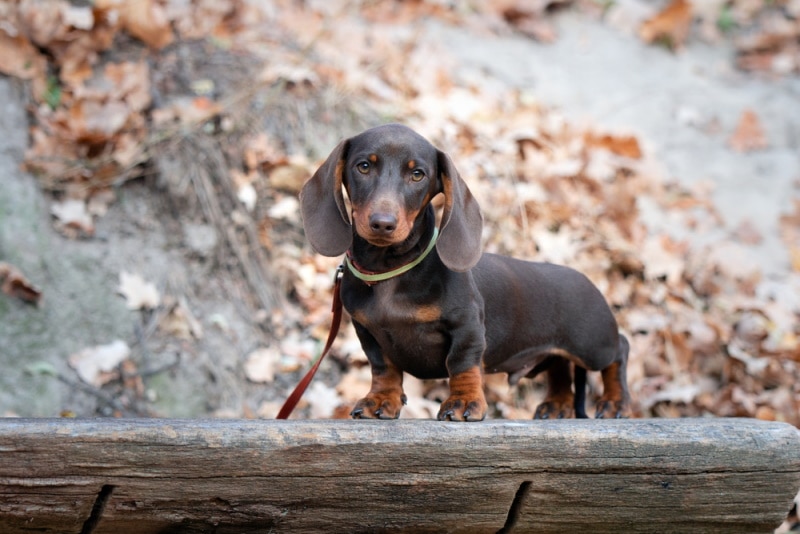
Click Below to Skip Ahead
Dachshunds hardly need an introduction. Famous for their long bodies and stout legs, Dachshunds were originally developed to track, chase, and flush out badgers and similar burrowing game. In fact, their name translates roughly to “badger dog” in German!
Despite their small stature, Dachshunds have won the hearts of many dogs owners internationally. So, if you are curious to learn more about the “wiener dog”, read on!
Breed Overview
Height:
14–19 inches (standard); 12–15 inches (miniature)
Weight:
16–32 pounds (standard); under 11 pounds (miniature)
Lifespan:
12–16 years
Colors:
Solid red, black, and tan, red and tan, merle
Suitable for:
Families with older children
Temperament:
Devoted, playful, curious
Dachshunds come in an array of different colorations, including solid colors, merle, and brindle. While the shorthaired Dachshund is the most common, they also come with wired hair and long hair.
Today, these animals are largely kept as companion animals. They are quite small and make great pets. They ranked as the 12th most popular dog breed in the United States in 2018, and their popularity has remained about the same for many years.
Dachshund Characteristics
Dachshund Puppies

We always recommend adopting before shopping when it comes to pets. Just note that puppy Dachshunds are often rare at most local rescues, so you need to think about if you willing to adopt an older pup.
However, if you do go to a breeder, do your research to ensure they are reputable. Breeders can be quite expensive. Their dogs undergo proper health testing before they are bred, which helps prevent common health conditions from being passed on. Like all breeds, the Dachshund is prone to a few genetic problems. The only way to ensure that puppies don’t inherit these problems is to perform health testing, which only reputable breeders tend to do.
Furthermore, puppies from breeders often receive more vet care. Their first vaccinations and vet visit are often included in the cost of the puppy. While you may have to pay more up front, you’ll pay less in vet bills during the first year. Many puppies even have basic training before they are adopted, which lowers the amount of money that you’ll need to spend on them.
Animal shelters often provide their puppies with vaccinations and health checks. However, there is no way to know where the puppy came from. Therefore, we recommend having an emergency fund in case the puppy ends up getting sick later. Most breeders offer health guarantees, but this is not the case with rescues.
When purchasing from an unqualified breeder, there is no way to tell what you are getting. Most puppies don’t come with any vaccinations or health checks. Therefore, they may end up costing you thousands.
Temperament & Intelligence of the Dachshund

Dachshunds are playful dogs that love to chase just about anything. They have a fairly high prey drive, which often means they love games like fetch and coursing. However, they will chase just about anything that runs, including small animals, birds, and even butterflies. Keep this in mind when you’re considering adopting one.
Like many hounds, they are quite intelligent. However, this does not make them easy to train. They are incredibly stubborn. Dachshunds were bred to find a badger and chase it. None of those steps required input from a human. Therefore, they were never bred to follow commands. They simply followed their nose. Even as companion animals, they still do this.
Many owners joke that Dachshunds will even disobey you when you ask them to do something that they want to do, like chasing a ball. That’s simply how these dogs are. There is no amount of training or special technique that will make them listen to you all the time. Luckily, because of their smaller size, they tend to be better behaved indoors than most dogs.
These dogs do have a loud bark. This comes from their days as a flushing dog, where have their job was to scare prey animals. This seems to vary from Dachshund to Dachshund, though. Some bark all the time and need extensive training to stop. Others will hardly make a sound. Socialization may play a role in this, so be sure to introduce your dog to many different things at a young age. Then, they won’t need to bark at everything.
The Dachshund is known for being devoted to their owners. They are fearless and may attempt to protect their owner if they feel the need, despite their small size. They are a bit aloof with strangers. They don’t see everyone as a friend, and it can take time for them to warm up to others.
In many cases, these dogs are difficult to housebreak. This is because of their smaller size and their stubborn nature. They need to be let outside frequently simply because of how small their bladder is. Combined with their disdain for listening to people, this can make house training difficult.
While Dachshunds are small dogs, that doesn’t mean that they are a good option for everyone. Without the proper training, they can be quite aggressive and destructive. They require socialization at a young age to accept strangers into their “territory” and are generally not as friendly as other small dogs. However, their fearless nature and devoted behavior make them great pets with the right training.
Are These Dogs Good for Families?👪
We do not recommend these dogs for families with small children. The Dachshund’s small size and long back make it easy for smaller children to injure them. A child that presses too hard on their back can easily cause injury, which can make the dog nip. Most bites from dogs occur because of injury or fear.
A Dachshund that is well socialized can get along perfectly well with a child that is well-behaved. The problem is when you introduce a fearful dog to a child who doesn’t understand how to handle smaller animals. These dogs are particularly against unfamiliar children moving too quickly or teasing them.
Ultimately, Dachshunds are typically fine with children who can be trusted not to injure them. Otherwise, a different dog is best.
Does This Breed Get Along With Other Pets?
Due to their high prey drive, we do not recommend these dogs for homes with small animals, like cats and birds. They will chase them with a surprising amount of determination, given their small size. Most will bark loudly while doing this, as they were bred to flush out animals from cover.
As you might imagine, this can terrify just about any cat, even those that are actually larger than the dog. Don’t let their small size fool you; these dogs are quite ferocious when it comes to chasing things.
They do usually get along with other dogs, though. They are not particularly pack-oriented, but many will accept other dogs with the proper socialization. We recommend introducing them to many different dogs at a young age. This will prevent them from seeing other dogs as threats.
Things to Know When Owning a Dachshund
Food & Diet Requirements 🦴
These dogs do not have any particular dietary requirements. They are usually capable of thriving on just about any high-quality commercial dog food. As a breed, they are not prone to food allergies or diseases that must be controlled through diet. For this reason, most of them live well into their senior years without any serious dietary restrictions.
We recommend choosing food that contains plenty of meat in the ingredient list. It should be the first ingredient too. Generally, whole meat and meat meal are both preferable. Meat by-products are of lower quality in many cases. These dogs are not typically sensitive to grain, so you can choose a grain-inclusive dog food unless your puppy has an allergy.
Switch your dog’s food often to keep their diet varied. This prevents them from developing a food allergy and ensures that they’re eating all the nutrients that they need. When you switch food often, you don’t have to worry so much about nutritional gaps.
Exercise 🐕
While they are small, Dachshunds do need a bit of exercise. They were not bred to be companion animals. Instead, they were bred to chase game through the woods. Therefore, you should ensure that they get at least an hour of exercise each day.
This can involve a few short walks or several play sessions. You do have to be a bit careful with how you exercise them, as their back is prone to injury. They should avoid excessive jumping and uneven terrain, so hiking is probably out of the question. They do love to chase things, so consider games like fetch.
Many can meet their exercise needs in a short amount of time if you simply stand in the backyard and throw a ball around. They are great for older children for this reason.
Training 🎾
Dachshunds can be stubborn, but they are not impossible to train. It is best to start training at a young age. Be firm but show kindness and positive reinforcement. Housetraining is can be tricky because they have small bladders too. It often takes a great deal of patience and persistence.
We recommend focusing on teaching your dog the basic commands, such as sitting and staying. You should also emphasize socialization. Puppy classes are good for this because they help train the dog and socialize them. These dogs can become territorial and aggressive unless they are introduced to many different people and dogs at a young age.
Grooming ✂️
The grooming needs of these dogs will depend on their coat type. Shorthaired Dachshunds will only need to be brushed about once a week with a soft-bristled brush. This will remove much of the excess fur, as well as dirt and debris. Brushing is a great way to keep these dogs clean, which eliminates the need for regular bathing.
If your dog has a different fur type, we recommend utilizing a steel comb to remove any tangles. Longhaired Dachshunds will need to be groomed two to three times a week to prevent mats and similar problems.
Keep an eye on their ears, no matter their coat type. Their floppy ears can easily trap dirt and dust, which can cause ear infections. If the ear appears dirty, clean it with a damp cotton ball. Longhaired dogs will need the hair inside their ears clipped to prevent excess dirt and moisture from being trapped in the ear canal.
Like with all dogs, you will have to brush their teeth regularly to prevent periodontal disease. This is a common problem in dogs that increases the risk for infections. It isn’t only a matter of protecting their teeth. Infected gums provide an access point for bacteria into the bloodstream, which can directly affect your dog’s organs.
You should also clip your dog’s nails regularly. This will prevent painful splitting and similar nail problems.
Only bathe these dogs when they are visibly dirty. Brushing them should be enough in most cases. However, all dogs are going to roll in mud or get into something stinky at least once. You can bathe them during these times, but avoid giving them a bath just because they “haven’t had one in a while.” This can dry out their skin and coat, which can cause skin irritation and infections. It can also make them shed more, as dry, dead hair is more likely to fall out.
Health and Conditions 🏥
Due to their long back, these dogs are prone to intervertebral disk disease (IVDD). This condition first causes the dogs to experience muscle weakness and pain in their back legs. Eventually, this worsens until the dog is paralyzed. Treatment involves crate-rest and medication. In extreme cases, surgery may be required. Some dogs never recover the use of their back legs.
Obesity, jumping, improper handling, and overexercising can all increase the odds of this disease. About 25% of Dachshunds will experience this condition at some point in their lives. Luckily, there is a screening program for this condition that some breeders use, which allows them to produce healthier puppies.
Particular coat conditions can also cause problems for these dogs. For instance, merle and “double dapple” puppies are more likely to have some degree of hearing and vision loss. This is because the merle gene affects how pigment is handled, which has an effect on the dog’s eyes and ears. Therefore, you should be extra-cautious in adopting merle puppies.
Many health conditions can be counteracted through proper breeding. With health testing, it is possible to identify dogs that are carriers for these conditions. By avoiding breeding carriers with other carriers, breeders can effectively ensure that their puppies do not end up with many of these conditions. However, genetic testing is expensive. Therefore, puppies whose parents underwent the proper health testing are often more expensive.
If you want a healthy puppy, you should expect to pay the appropriate price for them. High-quality Dachshunds tend to be more expensive for a reason: their breeders put more money into their health and care.
Male vs Female
Females are usually a bit smaller than males, but not by much. It is difficult to tell these sexes apart based on size alone. On average, females are about an inch shorter than males. But it isn’t odd to find females that are larger than some males.
There is no significant temperament difference between these two sexes. Both will act about the same around strangers and other dogs. One is not more territorial than the other.
Which sex you choose is largely a matter of personal preference, as there aren’t many practical considerations that you’ll need to make.
Related:
3 Little-Known Facts About the Dachshund
1. They have a significant prey drive.
Most people see these small dogs and assume that they were made to be companion animals. However, this is not the case. Because they are hounds and were made to hunt, they will act similarly to other hounds. Some may chase cats and other small animals.
2. Dachshunds can be ferocious.
Don’t let their small size fool you; these dogs are fearless. They were bred to go after badgers, after all. They are easy to socialize because of their confident nature, and they often make good alert dogs as well.
3. There are many different coat types.
While most people know of the shorthaired Dachshund, many breeders also specialize in wire-coated Dachshunds and longhaired Dachshunds. Both of these types are purebred and recognized by kennel clubs. They’re just a bit less common.

Related Read:
- Dachshund Names
- Male Dachshund vs Female Dachshund: What’s the Difference?
- 10 Best Dog Food for Dachshunds – Reviews & Top Picks
Final Thoughts
Dachshunds can make great dogs for those families with older children. They are known for their devoted and playful nature. Many will chase balls for hours on end. However, they will also chase just about anything else, so we don’t recommend them in homes with small pets, like cats.
While they are small, that doesn’t necessarily mean they act like other small dogs. They are hounds through and through. They are a bit stubborn and enjoy following scent trails. Therefore, it is best to keep them on a leash.
Dachshunds can make amazing companions with training and are perfect for smaller living spaces. Plus, they are adorable!
See also: Can a Dachshund Be a Service Dog? What You Need To Know
Looking to mix up the traits of the Dachshund with another breed? Take a look at these possible mixes!
Featured Image Credit: NORRIE3699, Shutterstock







